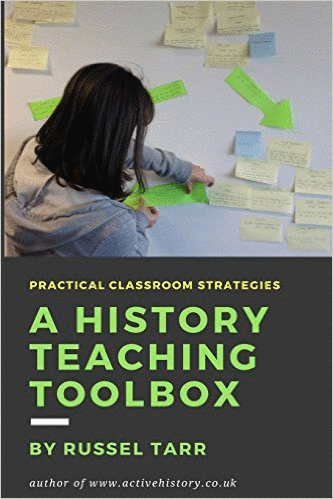Transform your history classroom
ActiveHistory provides educational, award-winning interactive simulations, decision-making games, self-marking quizzes, high-quality worksheets and detailed lesson plans for the school history classroom. All resources have been designed by full-time history teacher Russel Tarr.
An ActiveHistory subscription provides everything you need to construct and deliver a History course from start to finish for the entire 11-18 age range!
These consist not just of lesson plans, worksheets and teacher notes, but also multimedia lectures and interactive games and historical simulations ideal for remote learning and self-study.
World History teaching resources for the high school classroom: lesson plans, worksheets, quizzes and simulation games for KS3, IGCSE, IB and A-Level teachers.

In February 2022, Russia invaded Ukraine, an independent sovereign nation. The international community overwhelmingly condemned this act of aggression.
What are Russia's motives for acting in this way?
And what is the best way forward to bring lasting peace and stability back to Europe?
I developed the following materials with the generous input from members of the IBDP History Teachers Facebook Support Group.
Student Worksheet: The Ukraine-Russia War
This worksheet can be downloaded from Google Docs, edited, amended and developed however the teacher sees appropriate. I will likely be developing these materials as events unfold.
The tasks include:
A timeline of relations between Ukraine and Russia
"Read the first two events in the following timeline, then find an image on the internet relating to one of the people, events or places mentioned. Put this into the right-hand column with a caption. Repeat the process for the remaining batches of events"
Sourcework: Putin's view of Ukraine
Vladimir Putin denies that Ukraine has any right to exist as an independent country. Read the following, which combines extracts from several of his speeches, and answer the question which follows.
The international dimension
"Putin's invasion of Ukraine was motivated not just by his view that historically it 'belongs' to Russia, but also by his view that it poses a security threat to Russia.
Considering whether there is any truth in these arguments is necessary to determine the best way to respond to bring peace back to Europe.
Read through the following two interpretations. Which of them do you agree with?"
Interpretation 1: Putin's invasion of Ukraine is reflective of his aggressive desire to rebuild a new Russian empire |
Interpretation 2: The invasion of Ukraine reflects Russia's genuine security concerns about the eastward expansion of NATO |
In the words of President Joe Biden, “This was always about naked aggression, about Putin’s desire for empire by any means necessary". Germany's Angela Merkel also describes Putin as "irrational". |
Putin, like many Russians, was traumatized by the disintegration of the Soviet Union in 1991, The USSR disappeared, and Russia found itself much weaker and more vulnerable to rival great powers. |
Although NATO was set up to contain the USSR, it argues that its objectives have always been purely defensive and that it has no offensive ambitions against Russia. |
The expansion of NATO eastward is seen by Russians as directed against their country. Rockets are already stationed near the Russian border in Romania and Poland. |
The states of Eastern Europe, including Ukraine, are independent countries which have the right to form any alliances they wish. |
In 1997, 50 foreign policy experts signed an open letter to US President Bill Clinton, saying, "We believe that ... to expand NATO ... is a policy error of historic proportions". |
Putin's actions in Ukraine prove that NATO was right to expand into Eastern Europe. |
Putin's invasion of Ukraine only happened because of NATO expansion into Eastern Europe. |
If you take this view, any actions short of defeating the Russians will look like appeasement - the notorious policy of giving way to Hitler in the 1930s which, far from pacifying him, ultimately emboldened him to launch World War Two. |
If you take this view, then the door is open to discussion, negotiation, compromise and concessions - just like the West did with the Soviet Union in various Cold War crises to avoid warfare escalating even more widely and catastrophically. |
Task: So how should the international community react?
"Here are four possible ways in which the international community could react to the war in Ukraine. Consider the arguments for and against each one. Your teacher will then put you into small groups to debate the best way forward, and then chair a whole-class discussion."
- NATO agrees not to accept any new members in return for Russia withdrawing from Ukraine.
- NATO continues to impose harsh economic sanctions on Russia.
- NATO declares a "no-fly zone" over Ukraine to deter Russian air attacks.
- Putin is permitted to annex Ukraine, but only on the understanding that any attempts to expand Russia further will be met with a full NATO military response.
Extension Tasks
Myths and misconceptions in the debate on Russia
Divide the class into groups, with each one allocated a different one of the 16 myths and misconceptions listed on this website. Each group should report its findings back to the class, covering the following five points:
- What is the myth?
- Who advocates or subscribes to it?
- Why is it wrong?
- What is its impact on policy?
- What would good policy look like?
What Are the Global Implications of the Ukraine Crisis?
Consider the eight global implications listed on this website. Choose one to read about further and report your findings back to the class. Produce a labelled infographic of a world map highlighting how the conflict could have different results around the world.
Ukraine: How might the war end? Five scenarios
Read through the five scenarios provided on this website. After reflection and discussion with a partner or in small groups, divide 100% between the five scenarios to reflect your view of the most and least likely outcomes. Compare your thoughts with the rest of the class.
Recommended Video Documentary

© 1998-2025 Russel Tarr, ActiveHistory.co.uk Limited (Reg. 6111680)
1 Torrin Drive, Shrewsbury, Shropshire, SY3 6AW, England
Privacy Policy | Contact






